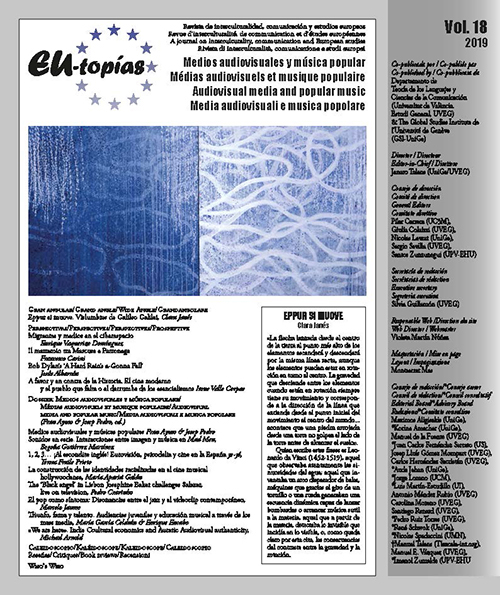Success, fame and talent: young audiences and music education through the mass media
DOI:
https://doi.org/10.7203/eutopias.18.16848Keywords:
Success, fame, talent, mass media, musical education Abstract
Abstract
The digital information society poses new and constant educational challenges. This article sets out some observations that emerged from an ongoing investigation which focuses on young people as adolescents, more specifically on how they view reality through screens, and what new teaching-learning opportunities can audiovisual media offer us for the practice of music education in schools. We introduce a description of the theoretical aspects related to the impact of young people’s cultural and audiovisual consumption habits, and how this influences their own identity and construction of the self, as well as their processes of socialization. In addition, the article makes a subsequent comparative analysis of the projected image of music and performers in selected music television programs, paying special attention to the phenomena of Operación Triunfo and La Voz. Finally, we observe a set of stereotypes and common traits associated with the world of music and its participants.
 Downloads
Downloads
 References
References
Alonso, Luis Enrique (2005), La era del consumo, Madrid: Siglo XXI de España.
Balardini, Sergio (2002), Jóvenes, tecnología, participación y consumo, Buenos Aires: CLACSO.
Bereday, George Z. F. (1968), El método comparativo en Pedagogía, Barcelona: Herder.
Bisbal, Marcelino (1999), «La idea del consumo cultural: Teoría, perspectivas y propuestas», Revista de Comunicación, 108, págs. 32-39.
Bourdieu, Pierre (1998), La Distinción, Madrid: Taurus.
Digón Regueiro, Patricia (2008), «Programación infantil y TV sensacionalista: entretener, desinformar, deseducar», Comunicar, Revista Científica de Educomunicación, 31, págs. 65-76.
Ferrer, Antonio (2010), «Millennials, la generación del siglo XXI», Nueva Revista de Política, Cultura y Arte, 130. Disponible en http://n9.cl/TbV.
García Canclini, Néstor (1993), La globalización imaginada, México, D. F: Paidos.
García, Felipe; Portillo, Javier; Romo, Jesús y Benito, Manuel (2007), «Nativos digitales y modelos de aprendizaje», IV Simposio Pluridisciplinar sobre Diseño, Evaluación y Desarrollo de Contenidos Educativos Reutilizables, Bilbao: Universidad del País Vasco. Disponible en http://ceur-ws.org/Vol-318/.
Hargreaves, David J. (2011), «Intercultural perspectives on formal and informal Music learning», Dedica, Revista de Educação e Humanidades, 1, págs. 53-66.
Hilker, Franz (1964), La pedagogie comparée. Introduction à son historie, sa théorie et sa practiqué, Paris: Institut Pédagogique National.
Ibáñez, Elena; Cuesta, Martín; Tagliabue, Rosana y Zangaro, Marcela (2008), «La generación actual en la universidad: El impacto de los Millennials», V Jornadas de Sociología de la UNLP de Argentina, La Plata: UNLP. FAHCE. Disponible en: http://www.memoria.fahce.unlp.edu.ar/trab_eventos/ev.6146/ev.6146.pdf.
Marfil-Carmona, Rafael (2015), Educación artística y comunicación audiovisual: espacios comunes, Granada: Universidad de Granada.
Martín-Barbero, Jesús (2002), «Jóvenes: comunicación e identidad», Pensar Iberoamérica: Revista de cultura, 0. Disponible en http://n9.cl/7O2.
Morduchowicz, Roxana (2004), El capital cultural de los jóvenes, México: Fondo de cultura económica.
Pasquier, Dominique (1999), Les jeunes et la culture de l´écran. Enquete nationale auprés des 6-17 ans, Paris: Revue Reseaux.
Prensky, Marc (2001a), «Digital natives, digital immigrants, Part I», On the Horizon, 9(5), págs. 1-6.
Prensky, Marc (2001b), «Digital natives, digital immigrants, Part II: Do they really think differently?», On the Horizon, 9(6), págs. 1-9.
Santos Asensi, Javier (1997), «Música maestro... Trabajando con música y canciones en el aula de español», Carabela, 41, págs. 129-152.
Semán, Pablo (2016), «Música, juventud, hegemonía: Salidas de la adolescencia», Estudios Sociológicos, 34 (100), págs. 3-40. Disponible en http://www.jstor.org/stable/ 24725776.
Downloads
Published
How to Cite
-
Abstract401
-
PDF (Español)236
Issue
Section
License
The authors conserve the copyright. All content published in EU-topías. Journal of interculturality, Communication, and European Studies are subject to the license Creative Commons Attribution-NonCommercial-ShareAlike 4.0 license. The full text of the license can be found at <http://creativecommons.org/licenses/by-nc-sa/4.0>
They may be copied, used, disseminated, transmitted and publicly displayed, provided that:
- The authorship and original source of the publication is cited (journal, publisher and URL of the work).
- They are not used for commercial purposes.
- The existence and specifications of this license of use are mentioned.
It is the responsibility of the authors to obtain the necessary permissions for images that are subject to copyright.



